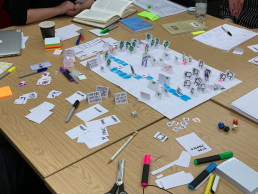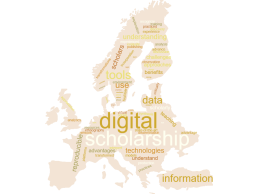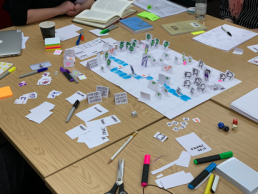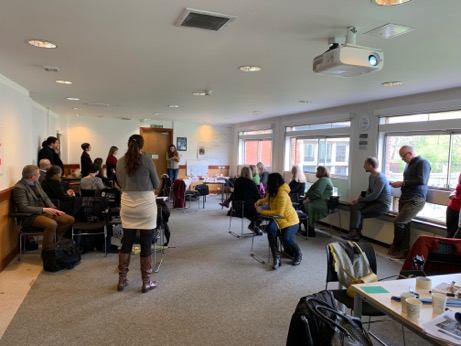COST-ARKWORK event feedback summary report published
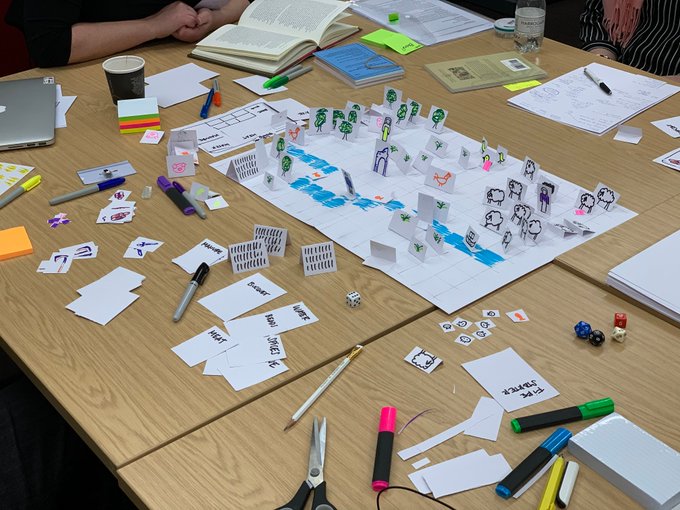
COST-ARKWORK collected feedback from all events organised throughout the action. The response was largely extremely positive and the participants and action members appreciated a lot the events and their programme. More information on the results including quotes from action participants can be found in the published report COST-ARKWORK Summary of event feedback.
Online training school is starting!
Our online Training school "How can archaeological museums work in the time of COVID?" is starting today
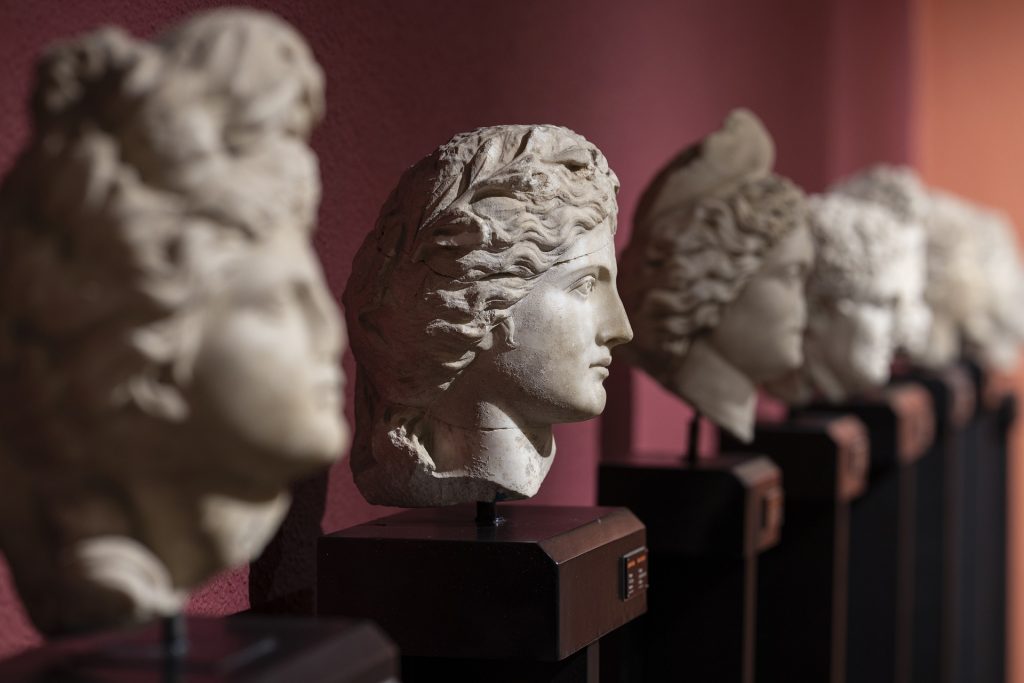
The COVID situation, making it difficult or impossible to visit museums in the physical environment, is a challenge for museum professionals and the members of different archaeology- related communities. Museums need new means for communicative work and reaching visitors - new ways to interact with museum collections.
Our online training school is starting today and all lectures will be broadcast live on the COST ARKWORK Facebook page https://www.facebook.com/CostArkwork
Training school programme (all times are EET):
| 15 March 2021 | ||
| 13.45 | Welcome | |
| 14.00-14.45 | Lecture 30 min.+15 min for discussion Digital museum projects in the time of covid-19 | Chiara Zuanni, University of Graz |
| 14.45-15.30 | Lecture 30 min.+15 min for discussion Museums and online communities | Costis Dallas, University of Toronto |
| 15.30-16.30 | Coffee break in the breakout rooms | |
| 16:30-17:00 | Workshop. How to study online communities: ARKWORK focus group research | Ingrida Kelpšienė, Vilnius University |
| 17.00-17.30 | Asynchronous work assignment. Topic, objective, and tasks | Suzie Thomas, University of Helsinki |
| 16 March 2021 | ||
| 10.30-16.00 | Asynchronous work. Online community case study. Meeting online first at 10:30 - recap; 11:00 opportunity for questions and private discussions; 15:00 reconvene - recap and questions | [moderators] Suzie Thomas, University of Helsinki; Ingrida Kelpšienė, Vilnius University |
| 17 March 2021 | ||
| 12.00-13.00 | Presentation of asynchronous work results | [moderators] Suzie Thomas, University of Helsinki; Ingrida Kelpšienė, Vilnius University |
| 13.00-13.45 | Lecture 30 min.+15 min for discussion On the road to everywhere. Archaeological routes for online travellers during the pandemic? | Jacqueline Balen, Archaeological Museum in Zagreb |
| 13.45-14.30 | Lecture 30 min.+15 min for discussion From visitor studies to the exhibition. | Rimvydas Laužikas, Vilnius University |
| 14.30-15.30 | Coffee break in the breakout rooms | |
| 15.30-16.30 | Workshop. How to prepare a Twitter exhibition: interpretive planning, design and implementation | Costis Dallas, University of Toronto |
| 18 March 2021 | ||
| 10.30-16.00 | Asynchronous work Preparation of Twitter exhibition. Meeting online first at 10:30 - recap; 11:00 opportunity for questions and private discussions; 15:00 reconvene - recap and questions. | [moderators] Costis Dallas, University of Toronto; Rimvydas Laužikas, Vilnius University |
| 19 March 2021 | ||
| 12.00-13.00 | Opening of Twitter exhibition and presentation of exhibits (results of asynchronous work) | [moderators] Costis Dallas, University of Toronto; Rimvydas Laužikas, Vilnius University |
| 13.00-13.45 | Lecture: 30 min.+15 min. for discussion Immersive experiences and difficult heritage: Past lessons, Challenges ahead |
Agiatis Benardou, Digital Curation Unit, Athena Research Centre |
| 13.45-14.30 | Lecture: 30 min.+15 min. for discussion The Playful Turn in Heritage Studies and Gamification of Heritage Representations | Piraye Hacıgüzeller, University of Antwerp |
| 14.30-14.35 | Closing the school | |
| 14.35-16.00 | Coffee in the breakout rooms |
Online Training School
How can archaeological museums work in the time of COVID?
Online, 15-19 March 2021
The COVID situation, making it difficult or impossible to visit museums in the physical environment, is a challenge for museum professionals and the members of different archaeology-related communities. Museums need new means for communicative work and reaching visitors - new ways to interact with museum collections.
The role of social networks sites (SNS) and the importance of social network-based communities has grown in the time of social distancing. The skills of online visitor studies and the competencies to organize the SNS exhibitions are some of the most important for museum professionals at this time.
COST ARKWORK online Training school is aimed to overview the museum work in the digital environment at the time of the pandemic and to develop the skills of SNS visitor studies and the curation of the Twitter exhibition.
COST ARKWORK online Training school is open to museum professionals, social sciences and humanities scholars, MA and PhD students. Students will be expected 20 hours of their time during the week of the training school for attendance of synchronous sessions and asynchronous preparation and collaboration.
Participation in the Training school is free of charge but registration is required.
Registration at: <https://forms.gle/67dTd4ZabmuQgD5N7>.
Registration closes - 10 March 2021, 17.00 EET
We will respond to applicants by 12 March 2021, 17.00 EET
Training school programme (all times are EET):
| 15 March 2021 | ||
| 13.45 | Welcome | |
| 14.00-14.45 | Lecture 30 min.+15 min for discussion Digital museum projects in the time of covid-19 | Chiara Zuanni, University of Graz |
| 14.45-15.30 | Lecture 30 min.+15 min for discussion Museums and online communities | Costis Dallas, University of Toronto |
| 15.30-16.30 | Coffee break in the breakout rooms | |
| 16:30-17:00 | Workshop. How to study online communities: ARKWORK focus group research | Ingrida Kelpšienė, Vilnius University |
| 17.00-17.30 | Asynchronous work assignment. Topic, objective, and tasks | Suzie Thomas, University of Helsinki |
| 16 March 2021 | ||
| 10.30-16.00 | Asynchronous work. Online community case study. Meeting online first at 10:30 - recap; 11:00 opportunity for questions and private discussions; 15:00 reconvene - recap and questions | [moderators] Suzie Thomas, University of Helsinki; Ingrida Kelpšienė, Vilnius University |
| 17 March 2021 | ||
| 12.00-13.00 | Presentation of asynchronous work results | [moderators] Suzie Thomas, University of Helsinki; Ingrida Kelpšienė, Vilnius University |
| 13.00-13.45 | Lecture 30 min.+15 min for discussion On the road to everywhere. Archaeological routes for online travellers during the pandemic? | Jacqueline Balen, Archaeological Museum in Zagreb |
| 13.45-14.30 | Lecture 30 min.+15 min for discussion From visitor studies to the exhibition. | Rimvydas Laužikas, Vilnius University |
| 14.30-15.30 | Coffee break in the breakout rooms | |
| 15.30-16.30 | Workshop. How to prepare a Twitter exhibition: interpretive planning, design and implementation | Costis Dallas, University of Toronto |
| 18 March 2021 | ||
| 10.30-16.00 | Asynchronous work Preparation of Twitter exhibition. Meeting online first at 10:30 - recap; 11:00 opportunity for questions and private discussions; 15:00 reconvene - recap and questions. | [moderators] Costis Dallas, University of Toronto; Rimvydas Laužikas, Vilnius University |
| 19 March 2021 | ||
| 12.00-13.00 | Opening of Twitter exhibition and presentation of exhibits (results of asynchronous work) | [moderators] Costis Dallas, University of Toronto; Rimvydas Laužikas, Vilnius University |
| 13.00-13.45 | Lecture: 30 min.+15 min. for discussion Immersive experiences and difficult heritage: Past lessons, Challenges ahead |
Agiatis Benardou, Digital Curation Unit, Athena Research Centre |
| 13.45-1350 | Closing the school | |
| 13.50-15.00 | Coffee in the breakout rooms |
Industry forum: Collaboration in archaeology and heritage: new opportunities in tech
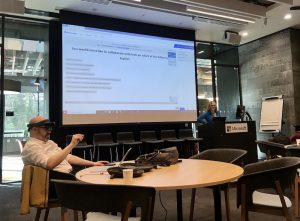
The industry forum provided an opportunity for those interested in heritage to learn about tech collaborations and also allows for networking opportunities. The industry forum was hosted by Microsoft Ireland and organised by the COST ARKWORK COST Action in collaboration with UCD School Of Information And Communication Studies (ICS).
An invited keynote expert talk was held by Mr. Tim Keefe, Head of Digital at the Chester Beatty Museum in Dublin, Ireland.
Schedule
Thursday 16 January 2020
10am-10:30am Registration (tea and coffee)
10:30am-11:30am Keynote
Tim Keefe, Head of Digital at Chester Beatty Museum
11:30-1pm Experiences with collaboration in different environments
This session will provide an opportunity for attendees to learn about different collaborative experiences available. It will involve a panel that will speak about their collaborative experiences and their lessons learned from the experience.
1pm-2pm Lunch
2pm-3:30pm Funding collaborative work in technology, archaeology, and heritage
This session will provide information about how to fund collaborative projects from grantors/funders as well as how different industries go about funding external collaborative work.
3:30-4pm Break (tea and coffee)
4pm-5pm Heritage collaboration opportunities with Microsoft
This session will include invited speakers from Microsoft Ireland, our host.
Friday 17 January 2020
10am-10:30am Registration (tea and coffee)
10:30am-12:00pm Providing feedback: interactive data collection about tech collaboration
This session will allow participants to engage in discussions about collaborative experiences.
12-1:30pm Brainstorming new avenues for collaboration with tech the archaeology and heritage sector
Using an open format, this session will allow attendees to brainstorm potential avenues for collaboration in the heritage sector. it will allow attendees to network with each other about potential future projects. Discussions can continue over lunch.
1pm-2pm Lunch
COST Action ARKWORK CA15201 Training School 2020 (Cologne, 4th-7th February) - Call for Trainees
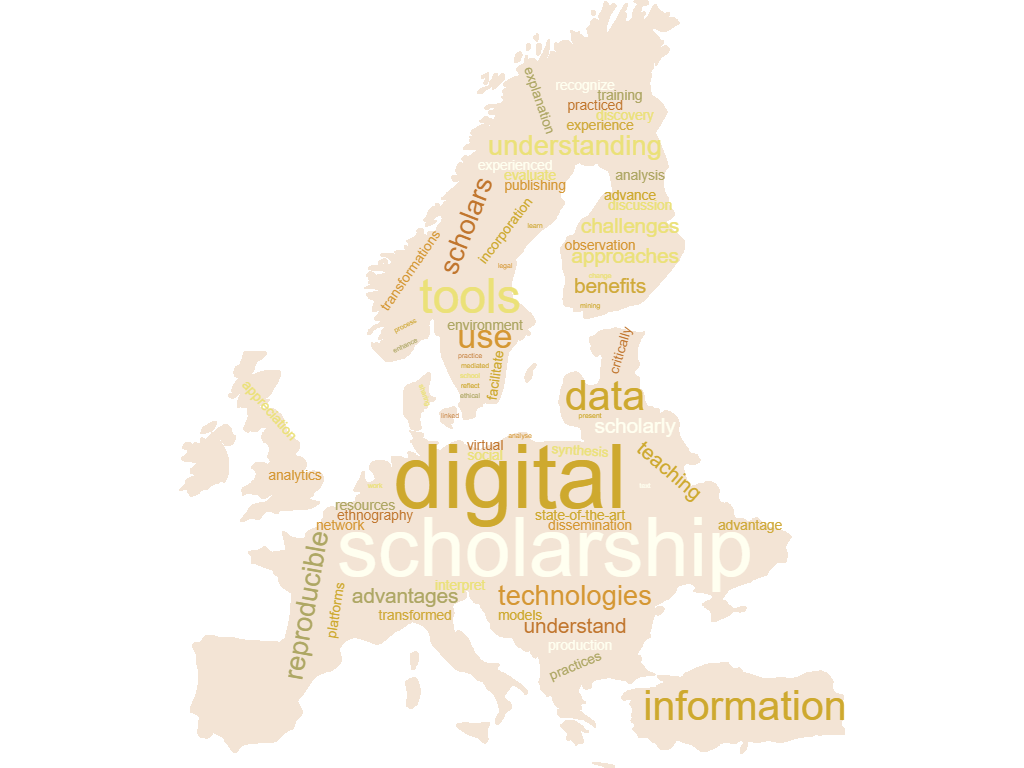
Methods of Digital Scholarship
Date & Location: Cologne, Germany, 4-7 February 2020 (4 days)
Local Host: Institute of Archaeology, University of Cologne, http://archaeologie.uni-koeln.de/31254.html
Venue: Cologne Digital Archaeology Laboratory, CoDArchLab, Institute of Archaeology, Kerpener Straße 30, 50931, Cologne (entrance from Weyertal St.)
About this Training School
The training school will acquaint participants with state-of-the-art methods and tools for digital scholarship. You will learn through lectures, practical classes, group work and discussion workshops how digital technologies facilitate, enhance and change scholarly practices and knowledge production. You will become familiar with established and emerging methods for data modelling, data mining and text analytics and you will get hands-on experience in working with linked open data, digital tools for reproducible research and platforms for sharing research and teaching resources. Furthermore, you will learn how to use network analysis, social media and virtual ethnography to advance your scholarly work and will reflect upon ethical and legal issues in digital research.
Learning outcomes:
By the end of the training school, you will:
- understand the benefits and challenges in using different methods and tools for digital scholarship
- evaluate and use a variety of appropriate models and methods for data modelling, data mining and text analytics
- identify, select and use appropriate platforms for sharing research and teaching resources
- use digital tools and methods to extract, analyse, present and interpret information for the production of scholarly knowledge
- recognize the advantages of reproducible research and take advantage of currently available methods for performing and publishing data analyses in a reproducible manner
- critically reflect upon the legal and ethical issues of digital research
Practical details:
The duration of this Training School is four working days. Grants will be provided for accepted participants as a contribution to the travelling costs, accommodation (5-days) and subsistence during the Training School (450 EUR for those coming from Germany, the Netherlands, Belgium and Luxembourg; 550 EUR for those coming from Austria, France, Switzerland and the Czech Republic; 700EUR for those coming from all other eligible countries). If participants, for any reason, are unable to attend all four days of the school, the grant will be reduced accordingly. There are no registration fees.
Organised by ARKWORK (https://www.arkwork.eu)
This COST-Action (https://www.cost.eu/actions/CA15201/#tabs|Name:overview) brings together the multidisciplinary work of researchers of archaeological practices in the field of archaeological knowledge production and use. The aim of the network is to make a major push forward in the current state-of-the-art in knowing how archaeological knowledge in a digital environment is produced, how it is used and how to maximise its positive impact on society. The focus of ARKWORK is on training the next generation of scholars and stakeholders by involving future leaders of research as well as high profile experts employed by the industry and public organisations.
Who should apply:
Researchers at different ranks are eligible to apply to the training school, including graduate and PhD students, postdoctoral researchers and professionals. Researchers from any branch of archaeology, as well as information science, archival science, informatics, computer science, culture studies, anthropology, sociology of knowledge, and other disciplines are welcome to apply, provided that they have an interest in archaeological practices and knowledge work in the digital environment.
Eligibility
Those who work/attend an education programme, or have citizenship/residency in the following states:
COST Full Members: Austria, Belgium, Bosnia and Herzegovina, Bulgaria, Croatia, Cyprus,
Czech Republic, Denmark, Estonia, Finland, France, Germany, Greece, Hungary, Iceland, Ireland, Italy, Latvia, Lithuania, Luxembourg, Malta, Montenegro, The Netherlands, Norway, Poland, Portugal, Romania, Serbia, Slovakia, Slovenia, Spain, Sweden, Switzerland, Turkey, United Kingdom and the Republic of North Macedonia.
COST Near Neighbour Countries: Albania, Algeria, Armenia, Azerbaijan, Belarus, Egypt, Georgia, Jordan, Lebanon, Libya, Moldova, Morocco, the Palestinian Authority, Russia, Syria, Tunisia, and Ukraine.
European RTD Organisations: European Organisation for Nuclear Research, European Fusion Development Agreement, European Molecular Biology Laboratory, European Space Agency, European Organisation for Astronomical Research in the Southern Hemisphere, European Synchrotron Radiation Facility, European XFEL Free-Electron Laser Facility, Institut Laue Langevin.
Applicants to the training school should submit:
- A motivation letter, not exceeding 300-500 words. This must include a clear indication of experience relevant to the topic of the training school; provide a rationale of why you are interested in the training school and how you envisage the training school contributing to your learning and research objectives.
- A short CV (2 pages max)
- An indication of whether you would like to be considered for funding
Please send your application to: Sebastian Hageneuer, [email protected]
For questions, please write to: Prof. Dr. Eleftheria Paliou, [email protected]
The applicants will be informed about the result of their application via Email by November 29th. Applicants that will not receive a grant, but do receive an invitation can participate with their own or their institute’s funding.
Closing date for applications: 15th November, 2019
UX Design in Archaeology and Heritage
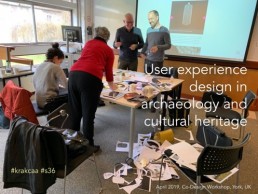
Across the month of April 2019, ARKWORK (through its Working Group 2 on Knowledge Production and Archaeological Collections) sponsored two major events on User Experience (UX) Design in Archaeology and Heritage, led by Francesca Dolcetti and Dr Sara Perry (University of York), and Dr Rachel Opitz (University of Glasgow). Below Francesca, Sara and Rachel provide an overview and brief summary of outcomes associated with each event:
- a two-day workshop on the co-design of digital experiences for archaeology (hosted in York and attended by 23 people from two dozen European countries)
- a roundtable session on UX design at the annual Computing Applications in Archaeology conference (held in Kraków, featuring 10 talks by 20 people from across Europe, Canada, the US and Australia, and attended by upwards of 75 people)
More information on these events can be found online, including a blog post by Dr Anna Wessman of the SuALT project (University of Helsinki) who attended the co-design workshop, as well as details on contributions to the roundtable session compiled on Sara’s blog, and a Twitter thread which accompanied the roundtable compiled by Rachel.
Motivations
Concern for users’ experiences of digital resources, and for explicitly designing these resources in cooperation with – or led by – individual users themselves, has a long history, and is now considered imperative amongst most product designers today. However within the archaeological and cultural heritage sectors, despite the growing range of digital products developed for both specialist and non-specialist audiences (from websites to digital books, apps to videogames, databases to 3D viewers, etc.), design theory and participatory design practices are comparatively unknown or infrequently applied. The implications of this lack of engagement with core design approaches and audiences are tremendous, not least in terms of alignment of product/project goals with user outcomes and impactful forms of knowledge exchange.

We, as practitioners, may be inclined to develop digital resources with ourselves and our immediate colleagues in mind, not recognising just how diverse and unspoken are the needs of others (even others who may seem much like us). Indeed, we may not even be aware of the means by which we can involve others in the design process (Ciolfi et al. 2016; Mazel et al. 2012; Mason 2015; McDermott et al. 2014), leading us to create outputs without the benefit of any informed design thinking whatsoever.
With this predicament in mind and through the events described below, ARKWORK sought to explore two major themes around UX design:
- How do we do design as archaeologists and heritage practitioners?
- Where are we explicitly deploying design principles in our day-to-day practices, our records, archives and wider publications? And if we aren’t, why not?
Knowing that it is not uncommon for new methodological and theoretical approaches to be adopted quickly and potentially uncritically into the discipline, we were also interested to consider critical and value-led design. Herein ethics and explicit concern for problematising the design process, the product itself and its intended impacts, are woven into all stages of the development of new resources for our discipline. By our reckoning, such value-led approaches are rare in archaeology, and indeed they are uncommon even in the field of design itself (but see Jet Gispen’s Ethics for Designers as one exception). However they provide us with a roadmap for weaving design thinking in our practices in ways that minimise potential harms and increase potential benefits to specialists and wider audiences alike.
Below we offer background and reflection on the two main events that have structured our work to date.
Workshop on the co-design of digitally-mediated experiences in archaeology. University of York, UK, 1-2 April 2019
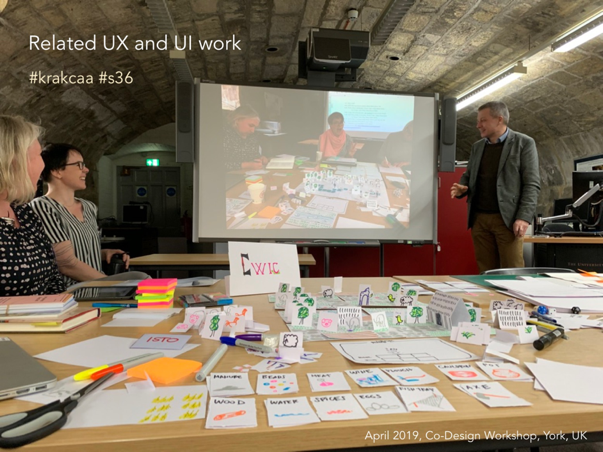
Activity summary
This workshop was designed as a two-day event aimed at providing a forum for testing the benefits of design strategies and tools coming from the participatory design (PD) field, and devising a digital publication work pipeline that involves end users and stakeholders from the outset. It was structured in four phases with participants working in four groups on the following activities: 1) case study description; 2) UX design; 3) prototyping; 4) evaluation.
Participants were recruited amongst practitioners working on projects focused on the creation of digital resources related to archaeological collections and heritage sites; or who have research interests in UX design, UX evaluation and the participatory design fields. They were assigned by Francesca to working groups based on their expertise, gender and skillset in order to create balanced teams. To use real case studies and ensure that participants were able to focus entirely on the design process, we assigned to each group a facilitator whose role was to provide a case study, along with a brief, and facilitate the group in creating a digitally-mediated experience that matches that brief (see more below about the facilitators and their case studies). Facilitators were recruited amongst researchers and practitioners with expertise in designing digital interactive experiences for various audiences, as well as in co-design and PD practices.
1) Case study description: During the first phase of the workshop each group was asked to work on a preselected case study, provided by one of our four facilitators, by articulating key information and available sources. Moreover, the facilitator outlined the design brief, defining the intended audience, technologies available and the expected outcomes.
2) UX design: Here participants defined how to structure their experience to match the facilitator’s brief. During this phase participants used some of the most common PD techniques, including:
- scenarios: description of a person’s interaction with a system, from a user perspective. Design techniques help to define how the proposed design is likely to be used in real life situations.
- Personas: fictional characters created to represent potential users and used to shape the design focus and to identify opportunities and challenges in designing for different user groups.
- Cards: design cards help to visualise exactly how design ideas can be created, modified and re-purposed, breaking down the components of a design object and demonstrating what kind of media, gestures and functionality can be supported by the design object.
3) Prototyping: During this phase each group created mock-ups of their designed experience to visualise and make it tangible. Participants were provided with a set of design resources, including wireframe and storyboard templates and Lego.
4) Evaluation: A two-stage evaluation of design results (prototypes), process and outcomes (participants’ gain) was incorporated within the workshop structure. During the first stage each group pitched their design to the other participants, by presenting features, components and intended audience of the experience. Then participants interacted and evaluated the prototype by completing an open-ended questionnaire. The second phase included observations carried out during the activities, and a focus group at the end of the workshop to gather participant feedback and triangulate it with the observations previously made.
In total, 23 participants from around Europe took part in the event, all working in the archaeological or museums sector designing digital resources (e.g., databases, online publications, digital archives, video games, interactive experiences, mobile apps, etc.) for different types of specialist and public audience. The case studies and their facilitators include:
Designing digital archaeogames – Facilitator: Juan Hiriart (University of Salford, Manchester, UK)
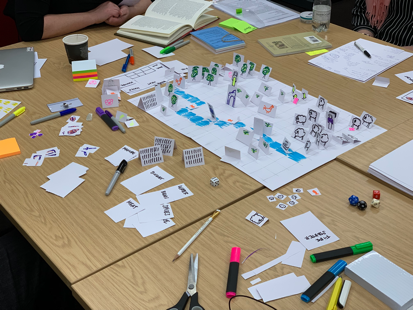
This case study aims at designing a digital archaeogame based on the early Anglo-Saxon period and the village of West Stow. This game will be used as an educational resource to teach students from primary schools (8-11 years old) about the Anglo-Saxon period. The aims of this project are:
- give players access to a historically accurate representation of the Anglo-Saxon world;
- understand the processes of historical change;
- convey historically based narratives of the chosen period;
- motivate pupils to play
Prehistory Performing – Facilitator: Gavin MacGregor (Northlight Heritage, UK)
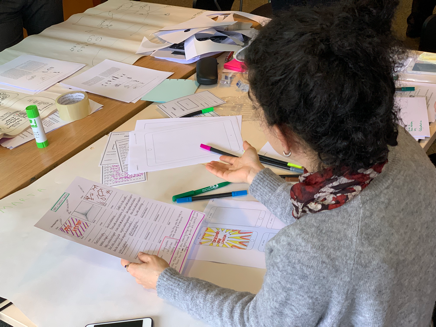
The focus of this case study is on the co-design of a web-based interface to attract wider audiences to support and attend prehistoric themed events and experiences. The focus in the first instance is the prehistoric resources and associated stories relating to the Neolithic and Bronze Age of Scotland (c4100 – 800 BC) but with potential to place it in a wider British and European context. The aim is to design a platform which blends provocative digital content to grow demand for event / experience-based products and potentially associated merchandise / rewards
Micro-Engagements at Castlegate – Facilitator: Claire Boardman (University of York)
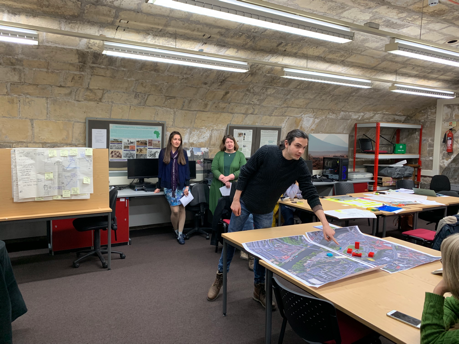
This case study focuses on the co-design of a place based, cumulative heritage experience for daily commuters (workers) passing through the Castlegate area of York. Accessed through mobile devices, with no restriction to the number or type of media and drawing on the city’s rich archaeological and historical archives, commuters will be able to meaningfully engage with over 1000 years of heritage via short (max 5min) micro-engagements or ‘happenings’.
Designing online interfaces – Facilitator: Eleonora Gandolfi (King’s College London, UK)
The main aim of this case study is to design an online interface/platform based on the Southampton Library special collections and archival material to increase engagement with local museums, historical groups and communities in Hampshire. Material offered online could also include descriptions from archive specialists to help users navigate the content. There might also be different audience groups formed by independent researchers and enthusiasts. Local historical groups might include volunteers that might have different levels of knowledge about archives, historical materials and catalogue format.
Outcomes
As reported in the focus group and evaluation sessions, the majority of participants enjoyed the event and the collaborative approach adopted. In most cases the activities were carried out in a collegial and fun atmosphere, also due to the important role played by facilitators in ensuring that every participant, in particular the ones less familiar with co-design practices, had a say in the design process.
In general, participants were pleasantly surprised by the methodology adopted and recognised the value of the multidisciplinary nature of the event and being able to work on broader and more varied themes. They also appreciated the potential applications of the co-design process and the possible transferability of some elements into their day to day work. Moreover, participants liked the focus on practical activities and the learning-through-doing approach that allowed them to work on concrete solutions and move away from abstraction. They also found the design resources helpful to focus better on the task at hand; however, they thought the toolkit needs to be more flexible and tailorable to the project.
Data gathered through both workshops provide useful insights on how the collaborative process unfolds and how different dynamics of participation take place within the same design phases, in a context where all participants are encouraged to develop ideas without worrying about technological, time or budget constraints. In all four groups, the process of sharing knowledge and skills and the forms of participants’ involvement varied greatly, due also to the role that facilitators decided to take in the participatory activities.
Roundtable Session #36: User Experience Design in Archaeology and Cultural Heritage. CAA Conference, Kraków, Poland, 23-27 April 2019
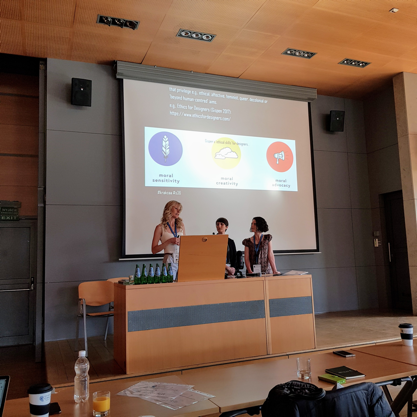
Activity summary
CAA roundtable #S36 was designed to build on our previous activities, including the workshop described above, as well as a workshop on digital publications and user interface design hosted by Rachel in Glasgow in May 2018, and a pilot workshop on co-design of digitally mediated experience hosted by Francesca and Sara in York in February 2019. Our CAA roundtable entailed three sets of short papers presented on user experiences, design processes and practice, and knowledge production. Each set of paper presentations was followed by a group discussion, and the session concluded with an extended discussion amongst all the speakers.
Presenters designed their talks around our session abstract:
“Despite the widespread dissemination of digital tools and applications in both archaeology and heritage, relatively little is known about their real effectiveness and impact on diverse audiences (specialists and lay publics alike). A new iterative design workflow, involving end users and stakeholders from the outset, as well as an accompanying design evaluation methodology, may open new avenues for engagement while, at once, constructively influencing our research objectives and epistemologies. In this Roundtable session, we seek to bring together a multidisciplinary group looking at different aspects of archaeological knowledge production to discuss theoretical and methodological issues in the field of participatory design and user experience, fostering a critical understanding of how this knowledge is used and its social impact. The aim is to convene researchers and practitioners in a dialogue that is focused on examples of interdisciplinary co-creation and user testing of Augmented, Virtual and Mixed Reality (AR, VR, and MR) and related digitally-mediated experiences for museums, archaeological and cultural heritage sites, and varied teaching and research contexts. We are particularly interested in practical experiences around how to integrate archaeological data, storytelling and digital platforms to create experiences truly tailored to the needs and expectations of users. The format of this Roundtable is a series of flash position papers (10 minutes maximum) followed by periods of moderated discussion. The session concludes with an open floor discussion and a wrap-up report summarising the discussion and suggesting follow-up activities. Position papers will be submitted in advance to the session chairs and shared with all panelists. The session welcomes participants from different sectors including but not limited to digital humanities, archaeology, museology, design research and Human-Computer Interaction (HCI).”
As described above, presentations in the session were grouped into three themes: ‘online first’ designs, ‘in person first’ designs, and design processes. The titles and speakers are listed below, accompanied in some cases by links to the presentations themselves. The session was actively live-tweeted using hashtags #KrakCAA and #S36, providing a parallel discussion area for both CAA participants and external audiences.
Introduction
User Experience Design in Archaeology and Cultural Heritage, Sara Perry, Francesca Dolcetti, Rachel Opitz
Part 1: ‘online first’ designs
Ksar es Said: Building Tunisian young people’s critical engagement with their heritage, Paola Di Giuseppantonio Di Franco, Mark Winterbottom, Fabrizio Galeazzi, Michael Gogan
From heterogeneous data to heterogeneous public: thoughts on transmedia applications for digital heritage research and dissemination, Damien Vurpillot, Perrine Pittet, Johann Forte, Benoist Pierre
User Interface Design and Evaluation for Online Professional Search in Dutch Archaeology, Alex Brandsen
Part 2: ‘in person first’ designs
Unintended Outcomes – VR, Heritage and User Engagement, William Michael Carter, Rhonda Bathurst, William Ciaran Lim-Carter
Engaging visitors with ‘invisible’ heritage: lessons learned on the impact of digital media, immersion, sound and storytelling, Jenny Wilkinson
Mixable reality, Collaboration, and Evaluation, Erik M Champion
Part 3: design process
Interaction Design (IxD) and Digital Heritage, Edward Gonzalez-Tennant
Managing Engagement Design Risk through Creative Constraints, Claire Boardman
Creating a unified design system across web, mobile, AR and VR, Damir Kotorić, Luke Hollis
Inclusive Digital Engagement for Heritage, Eleonora Gandolfi
Outcomes
The CAA is an important, high profile venue within the digital and computational archaeology and heritage communities. As such, we believe the CAA session raised the profile of the series of events organized by this group by presenting key questions and issues of relevance to UX design in archaeology and heritage, elucidated through earlier discussions including those at the workshops in Glasgow and York, and extending them to a wider audience both at the CAA itself and online through social media. The questions used to facilitate discussion at the CAA, which will provide focus for future work by our team on the topic, were:
- What does ‘success’ look like in terms of the user experience (UX) design process for archaeology/heritage? What constitutes ‘failure’?
- What should the role of archaeologists and cultural heritage practitioners be in the development of UX and User Interface approaches for use in the discipline?
- What are the unconscious choices you’ve made in your design processes, of which you later became aware?
- Are practitioners ethically obligated to state the values driving their design practices & explore the role their values play in the process? Why or why not?
- What values are implicitly embedded in your design processes and products? Have you ever considered applying ethical, feminist, queer, decolonial, or value-sensitive design? How did – or might – you structure it? And where (i.e., in relation to which processes, outputs, practices, tools, etc.) would you apply it first?
The concluding discussion of the roundtable addressed issues raised in the presentations, reflected responses to the key questions listed above, and attended to the overarching themes of critical thinking and reflection in design and value-led design and the need to identify the spaces in our workflows and practices that afford more experimentation with design. The CAA session was well attended, with upwards of 75 audience participants throughout the day.
Next steps
Lessons learned both from our workshops and from our CAA roundtable will form the basis of future research and design of resources for the wider professional community. We now aim to reengage participants from these various events, as well as others who’ve approached us separately about their shared interests in UX design, to:
- explore how we might structure co-design activities in ways that balance more open and creative approaches with more constrained approaches
- refine our design resources and processes to propose a fluid methodology for UX design in archaeology/heritage and to create a tailorable toolkit for practitioners
- explore an evaluation strategy which would allow us to effectively and robustly examine how collaborative design processes unfold in different ways, and if – and in what ways – these processes lead to personal and professional benefits for participants
- Promote value-led design and co-design as models that may be adopted by publishers and authors as they work together to develop new design-led formats, at a stage when innovative forms of digital publication are emerging
If you are interested to contribute to these future activities or have questions or insights to add to the conversation, please do not hesitate to get in touch with Francesca ([email protected]) who will be leading our work over the coming months.
Additionally, our experiences from these events, alongside data gathered during the workshop, are informing Francesca’s PhD research project, whose iterations have focused on:
- evaluation of the impact that interactive 3D models of archaeological sites have upon different audiences
- assessment of the design process behind the creation of digitally-mediated experiences in archaeology using participatory design practices
Findings from the events we’ve hosted are being integrated into Francesca’s dissertation to promote her own critical reflection on how the User Experience (UX) design process is adopted and incorporated into archaeological practice. Moreover, they will allow Francesca to articulate practical guidelines and provide insights and resources to other practitioners and archaeologists who wish to create digitally-mediated experiences by incorporating:
- UX design and co-design approaches to include intended audiences in the creative process
- An evaluation framework and iterative process to integrate users’ feedback into re-design and improvements
As above, please don’t hesitate to contact Francesca ([email protected]) for more information.
Acknowledgments
We’d like to thank all participants for their contributions to and ongoing support for our workshops and CAA session, as well as the leaders and administrators of ARKWORK and Vicky Moore for her administrative expertise in York. Photo credit for the images presented here goes to Sara Perry and Alex Brandsen.
References
Ciolfi, L., Avram, G., Maye, L., Dulake, N., Marshall. M., Van Dijk, D. and McDermott, F. (2016). Articulating co-design in museums: Reflections on two participatory processes. In Proceedings of the 19th ACM Conference on Computer-Supported Cooperative Work & Social Computing, 13–25. New York: ACM.
Mazel, A., Galani, A., Maxwell, D. and Sharpe, K. (2012). ‘I want to be provoked’: Public involvement in the development of the Northumberland Rock Art on Mobile Phones project. World Archaeology, 44 (4), 592–611.
Mason, M. (2015). Prototyping practices supporting interdisciplinary collaboration in digital media design for museums. Museum Management and Curatorship, 30 (5), 394–426.
McDermott, F., Maye, L. and Avram, G. (2014). Co-designing a collaborative platform with cultural heritage professionals. In Proceedings of the 8thIrish Human computer Interaction Conference (iHCI 2014), 18-24. Dublin: Dublin City University.
https://twitter.com/ArchaeologistSP/status/1121305773173346304
https://hal.archives-ouvertes.fr/view/index/docid/2172713
https://www.academia.edu/39818586/INCLUSIVE_DIGITAL_ENGAGEMENT
Call for papers: Special Issue of the Journal of Community Archaeology and Heritage:
Talking archaeology: qualitative interviewing and focus group research in archaeology-related communities
Edited by Costis Dallas (University of Toronto & Athena Research Centre) and Ingrida Kelpšienė (Vilnius University)
We invite contributions to a JCAH special Issue on "Talking archaeology: qualitative interviewing and focus group research in archaeology-related communities". We hope that these papers will provide a springboard for yet more qualitative research of this type (especially but not exclusively in the digital environment). We also hope to encourage new insights on the implications of such research on the meaning and impact of archaeology.
- We welcome methodological approaches, theoretical reflections, and substantive discovery research on the opportunities and challenges that emerge from qualitative interviewing, life histories, focus group research, narrative analysis, conversation analysis, content analysis, ethnography, and discourse analysis.
- Work may draw from stories, sayings, conversations, and testimonies by participants in practices drawing from or related to archaeology. We are especially interested in projects which have developed outside academic archaeological research and institutional policy and management work, and in contributions by those who might offer perspectives from outside Europe.
- We will consider submissions with diverse epistemological, geographical, and theoretical orientations, ranging from formal analysis of qualitative data to critical, phenomenological, ethnographic, and arts-based approaches, as long as they draw from sayings or conversations related to archaeology with members of relevant communities.
- Manuscripts submitted for this special issue should adhere to the general guidelines of the Journal for Community Archaeology and Heritage with regard to authorial voice, structure, referencing and formatting:
http://www.tandfonline.com/action/authorSubmission?show=instructions&journalCode=ycah20 .
The guidelines also include links to an EndNote output style for the JCAH house style, as well as a style guide, a reference style guide, and a Word template.
Deadlines:
- Submission of manuscripts (4-7,000 words, with 150 words abstract): 15 October 2019
- Publication: Print publication will depend the time required to review, revise, and finalize each paper and complete the collection. However, every individual paper will be published ‘Online First’ as soon as it is typeset. At this point it will be considered ‘final’, and thus be available for each author to share, use in CVs, etc.
By teaming up with the Journal of Community Archaeology and Heritage, we will reach a broad range of authors and will serve an interested readership, by focusing attention (for the first time in such a format) on qualitative human research on ''talk and conversation" with archaeology-related communities.
WG2 Workshop on the co-design of digitally-mediated experiences in archaeology
Workshop on the co-design of digitally-mediated experiences in archaeology University of York, UK, Monday 1 and Tuesday 2 April 2019

Organisers: Francesca Dolcetti (University of York), Dr Rachel Opitz (University of Glasgow), Dr Sara Perry (University of York)
Summary
User experience (UX) is a critical component of effectively mobilizing legacy datasets and collections in archaeology. In this sense, it is crucial to the success of the discipline as a scholarly, professional and pedagogical pursuit. However, our understandings of UX in archaeology, and our tools to facilitate UX design and evaluation, are arguably negligible. This workshop is focused on the interdisciplinary co-creation and user testing of digitally-mediated experiences geared at archaeological sites and collections. It aims to provide a forum for testing the benefits of design strategies and tools coming from the field of Participatory Design, and devising a digital publication work pipeline that involves end users and stakeholders from the outset. We seek to bring together a multidisciplinary group of researchers and practitioners working in the field of archaeological knowledge production, use and communication.
The activities proposed here will provide practical experiences on how to integrate archaeological data, storytelling and digital platforms to encourage professional and wider public engagement with the past. Moreover, the workshop aims to foster reflections on the importance of evaluation and iterative design, especially within the prototyping phase, to create experiences bespoke to diverse users’ needs and expectations.
Group activities
The workshop is organised as a two-day event with participants working in 4 groups, structured in four phases:
- case study description: each group will work on a preselected case study and articulate its basic information and available sources (metadata/paradata);
- experience design: each group will define both contents and intended audience, what kind of message they intend to convey and how to structure the experience;
- prototyping: each group will build a 2D/3D paper mock-up to visualise the experience and make it tangible;
- evaluation: each group will act as end users and cross-evaluate other groups’ experiences.
Programme
1 April
9.30-10.00 introductions
10.00-10.30 coffee break
10.30-11.00 introduction to the aim and structure of workshop activities
11.00-12.30 activity 1: case study description
12.30-13.30 lunch break
13.30-15.30 activity 2: experience design
15.30-16.00 coffee break
16.00-17.00 discussion
19.00 Social dinner
2 April
9.30-10.00 resume activities
10.00-10.30 coffee break
10.30-12.30 activity 3: prototyping
12.30-13.30 lunch break
13.30-16.00 activity 4: evaluation
16.00-16.30 coffee and final discussion
Call for participants
We are looking for 16 participants who:
- are working on projects focused on the creation of digital resources related to archaeological collections and heritage sites;
- have research interests in UX design, UX evaluation and participatory design fields.
- Are a member of COST Action ARKWORK. If you are interested in joining the action please contact the workshop organisers, and submit an expression of interest at https://arkwork.eu/join-us/
If you are interested in participating in this workshop, please send a short expression of interest (no more than 150 words) to Francesca Dolcetti ([email protected]).
Deadline for expressions of interest is Sunday 16 December 2018.
Participation to this event is open to Arkwork members only. If you are interested in joining the Action please contact the workshop organisers, and submit an expression of interest at https://arkwork.eu/
COST-ARKWORK at EUROMED2018
COST-ARKWORK is participating at the COST workshop How to overcome the fragmentation in Cultural Heritage research and funding in the context of Horizon Europe?at the 2018 EUROMED conference in Nicosia, Cyprus.
Also Agnieszka Kaliszewska, a COST-ARKWORK ITC grantee from the Polish Academy of Sciences is presenting at the conference a paper Non-invasive Investigation and Documentation in the Bieliński Palace in Otwock Wielkidiscussing and reflecting archaeological practices and knowledge work at the Bieliński Palace site in Poland in her presentation.
25 trainees at COST-ARKWORK Training School in Sarajevo
The WG2 training school took place between 17-21st September, 2018 in Sarajevo. The training school was hosted and organized by Meliha Handzic in cooperation with WG2 leader Gisli Palsson (pictured) at the International Burch University, and included trainers and guest speakers recruited both locally and across Europe. The programme took a broad approach to the issues at stake in managing archaeological datasets. Furthermore, one trainer coached the attendees specifically in how to prepare project proposals, building on projects that attendees had ongoing.
Invited scholars from the COST Action, as well as from Bosnia’s heritage and archaeological communities presented case studies reflecting on insights and experience gained in digital documentation and curation practices. These case studies were supplemented by hands-on workshops aimed at developing practical skills, including training in topic modelling, metadata analysis, PostGIS data storage and spatial analysis, and statistical analysis using R. As the week progressed, trainees were introduced to more theoretical perspectives on the social and political contexts in which archaeological knowledge is produced, with a keynote lecture by Prof. Isto Huvila and a discussion panel between all of the trainers. Field trips throughout the week offered students the opportunity to understand Sarajevo’s complex history and pivotal geopolitical role, and an opportunity to see many of the issues discussed in the classroom applied to present-day museological practice.Written by Gísli Palsson

